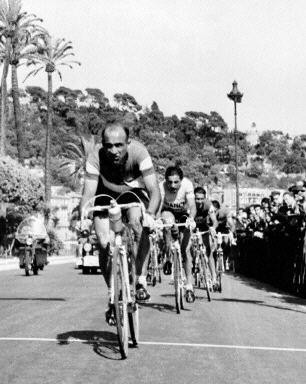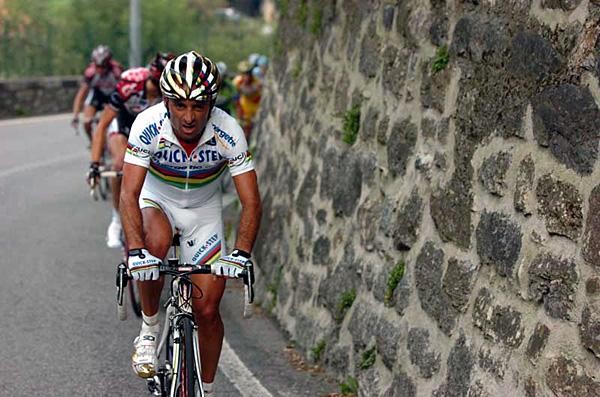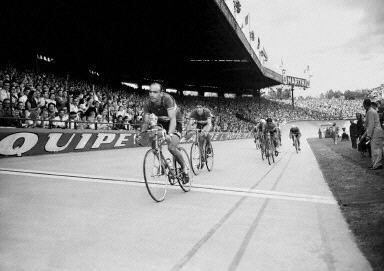Magni's 1956 Lombardia Exploit
Fifty years before Paolo Bettini stomped his authority over the Lombardia hills for an emotional win...



Fiorenzo Magni, October 19, 2006
Fifty years before Paolo Bettini stomped his authority over the Lombardia hills for an emotional win there was Fiorenzo Magni. The Italian, spurred on by Coppi's mistress, turned the race upside down resulting in a stunning result. Les Woodland looks back at the 1956 Giro di Lombardia.
You can't help feeling sorry for Paolo Bettini, can you? And admiring him at the same time. Despite losing a brother, he still brought his world champion's jersey to the start of Italy's final classic... And he won in his brother's honour. Not just by sprinting, not by some deal or connivance but by showing who was il padrone.
Well, sometimes it takes just that little extra stimulus, that little additional needle, to turn what could have been just an appearance ride, with which everyone would have sympathised, into something magnificent. That's what Bettini did - and it wasn't the first time that it had happened in the Giro di Lombardia.
Exactly 50 years ago we're turning back the clock, the same race but this time not a cuddly little man like Bettini but a gangling, balding and not always likeable fellow Italian called Fiorenzo Magni. If you saw the TV coverage, you may have spotted him among the celebrity guests at the finish. He looks different now, of course, because he's 80 but he's still as active as ever, running a car dealership in Monza.
Magni's right-wing views made him unpopular in post-war Italy but there was no doubting the man's courage. In the Giro of 1956, for instance, he crashed on the drop from Volterra on stage 12 and broke his collarbone. When Tyler Hamilton did that, he had every doctor his team could find to keep him on the road. When Magni did it, he told his doctor to do nothing, he spent the rest day off his bike, and next morning he restarted the Giro not with a cast but with an elastic bandage and a length of inner tube.
Why the inner tube? Because Magni's broken bone meant he couldn't pull on the bars with both arms and so he looped the tube round his bars, gripped it between his teeth and pulled on the bends like that instead. And did he finish? He certainly did. He not just finished but finished second overall, only three and a half minutes behind Charly Gaul. It takes guts like that to win three Giros and, in 1949-51, three Tours of Flanders in succession.
Get The Leadout Newsletter
The latest race content, interviews, features, reviews and expert buying guides, direct to your inbox!
This, then, was the man who started the Giro di Lombardia that October 21, 1956. He could feel reasonably relaxed. It was his last year on the bike, his season was over and he didn't expect anything. He wasn't surprised, therefore, to find himself in a bunch of dropped riders with 60km to go. And there he would have stayed had up from behind not come a car carrying Giulia Occhini, the so-called Woman In White who was Fausto Coppi's mistress.
Magni has never been explicit about his friendship or enmity with Coppi but it's no secret that Magni and Occhini detested each other. And as the car passed, Magni sensed that Occhini was sneering at him.
Well, Raphaël Géminiani said of Magni that "he got his successes with the subtlety of an axe. His tactic, always the same, was the passage of force." So such a man was not likely to take a sneer as anything but a blood insult. From being a man who hadn't much considered winning the Giro di Lombardia, he became determined not only to win it but to stop Occhini's lover in the process. So off he went, swearing, cursing, sweating, his balding head pointed in the direction of the break.
The race finished in Milan. In the very suburbs, the furious Magni caught Fred De Bruyne, Louison Bobet, André Darrigade and, most important of all, Fausto Coppi. It would be a fairy tale ending now to say that he rode past them and won the race. But that's not how it ends. In fact the win went to Darrigade, a blond Frenchman with a nervous, diffident manner and the kick of a mule. Unlike modern sprinters, he would start his gallops out of sight down the finish stretch and defy anyone to come by.
Was Magni disappointed? Well, he'd have liked to have won himself, of course, but after a chase like that and against a sprinter like Darrigade he couldn't have expected to. But that wasn't the point. Magni had done what he could to get Darrigade to the line first and he had two reasons to rub his hands. The incidental benefit came from a rule of the day that said a rider contracted to a sponsor in one country could ride for another sponsor abroad. So while Darrigade usually rode in France and northern Europe for the French bike-maker Helyett, in Italy he was contracted to the Italian maker, Bianchi.
Coppi had ridden for Bianchi in his greatest days - ever since 1947, in fact - but had just that year switched to Legnano, riding bikes that bore his own name. Getting Darrigade's Bianchi jersey over the line first, therefore, was a snub. But better than that was that Coppi - who came second - had been denied a sixth win in a race that really meant something to him. And as it turned out, he never won the race again.
As Magni crossed the line in third place, wearing his pale green jersey embroidered with the name of the Nivea cosmetics company, he couldn't deny himself a smug smile. Nor, being Magni, could he resist seeking out Coppi and rubbing it in.
"If your woman hadn't been so offensive," he sneered, "I'd never have had the incentive to come after you. And then the Frenchman wouldn't have beaten you, would he?"
You can almost hear him stamping his foot in petulance, can't you?